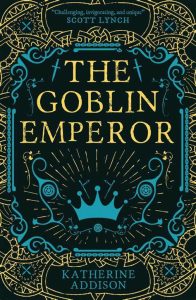Hopeful, intricate, melancholic, and nuanced all at once.
 The Goblin Emperor, the 2014 fantasy novel by Katherine Addison, is a fresh take on the “grimdark” narrative trend in fantasy fiction that emphasizes realistic characters, often at the cost of uplifting ones. The Goblin Emperor is a political fantasy that shucks away that limitation, and manages to be hopeful, intricate, melancholic, and nuanced all at once. It has received the Locus Award for Best Fantasy Novel and was nominated for the Nebula, Hugo, and World Fantasy awards.
The Goblin Emperor, the 2014 fantasy novel by Katherine Addison, is a fresh take on the “grimdark” narrative trend in fantasy fiction that emphasizes realistic characters, often at the cost of uplifting ones. The Goblin Emperor is a political fantasy that shucks away that limitation, and manages to be hopeful, intricate, melancholic, and nuanced all at once. It has received the Locus Award for Best Fantasy Novel and was nominated for the Nebula, Hugo, and World Fantasy awards.
The novel follows Maia, the banished half-goblin son of the elven emperor. When Maia’s father and older brothers all die in a mysterious accident, Maia is catapulted into a life he never expected to lead. Kirkus Reviews noted, The Goblin Emperor provides “spellbinding and genuinely affecting drama” as well as gorgeous prose and intricate worldbuilding. It is compulsively readable, and the reader’s understanding of the political factions of the court shifts constantly as we learn, alongside Maia, what it means to be the emperor of a glittering, hostile nation.
Grief ribbons through the story. Maia’s grief is a complicated undercurrent, and there are still, quiet moments in which the author masterfully lets us into Maia’s layers of feeling. The author manages to subtly show how love, grief, and anger intertwine to pervade Maia’s everyday life. The nation Maia has been forced to rule is deeply divided. There are people who are selfish, prejudiced, or cruel. The setup reminds the reader more of King Lear than The Lord of the Rings. Despite this, there is a sense of hope that permeates The Goblin Emperor. Efforts to make positive changes do not always succeed, but Maia keeps trying. People in his government see his efforts and work with him. In a time in which I often feel helpless in the face of political corruption, war, and other modern catastrophes, The Goblin Emperor is a subtle, gentle reminder that “grimdark” isn’t everything. Good can be realistic, too.
—Review by Isabella Zentner, Inscape Staff



